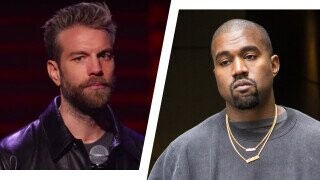Kanye Doesn’t Get Why Anthony Jeselnik Isn’t Canceled, But He Is

In case this is the first time you’ve been on the internet in the last month, Kanye West is on a mission to burn as many bridges as possible by being an anti-Semitic maniac. During West’s now infamous interview with Soviet Union-born scientist and YouTube personality Lex Fridman, he took a break from comparing Planned Parenthood to the Holocaust, accusing Jewish people of conspiring to have him diagnosed with bipolar disorder and praising Ivanka Trump’s “high DNA” to talk about the importance of humor and ask the tough questions about where controversial comic Anthony Jeselnik gets to draw the line.
West has frequently listed Jeselnik as one of his favorite comedians — after himself, of course. West again mentioned Jeselnik during his interview on the Lex Fridman Podcast, and when Fridman praised Jeselnik for his aggressively offensive style, West did what he does best — he made it about himself. West commented on Jeselnik’s habitual line-crossing, “But then, it’s, like, hurtful when I do it.”
After the recent slew of anti-Semitic drivel that West has spouted on any platform that will have him, it’s unsurprising that he would be drawn to the gleefully offensive humor of Jeselnik, though it seems likely that West is laughing for all the wrong reasons. Jeselnik famously puts on an amoral, borderline psychopathic stage persona to deliver some of the most terrifically tasteless takes on race, gender, domestic violence, children with cancer — the list goes on. Jeselnik has carved a niche as a kind of Andrew “Dice” Clay for the Internet Age.
Don't Miss
At the end of the day, though, Jeselnik’s stage persona is exactly that — it’s an act, it’s not how Jeselnik or any rational person would ever view the world. His one-liners and non sequiturs are crafted to throw his audience off-balance and laugh in spite of themselves, not because he’s trying to make a statement about whichever theoretical child is being abused in the punchline.
As Jeselnik explains in his 2015 Netflix special Thoughts and Prayers, his target isn’t the suffering people who seem to be on the butt end of his jokes. His goal isn’t to put down any marginalized group. The reason that he tells horribly offensive jokes is because he aims to erode the self-satisfied complacency of those on the internet who, after a tragedy or injustice, will publicly declare their holiness without taking action to help the struggling people they claim to champion.
“This is who I’m making fun of when I make a joke on Twitter the day of a tragedy — the people who see something horrible happen in the world, and they run to the internet,” he explains at the end of the set. “They all write down the exact same thing: ‘My thoughts and prayers.’ You know what that’s worth? F—ing nothing. You’re not even giving your time, your money or your compassion. All you are doing is saying, ‘Don’t forget about me today.’ … They’re like a wedding photographer who only takes selfies.”
When Kanye writes that he’s going “Death con 3 on JEWISH PEOPLE” and rails against the “Jewish Media,” there’s no joke — the line-crossing is done not to make a statement about the sanctimony of the Internet Age, but to attack a group of marginalized people who West believes is working against him. He uses hate speech as a weapon, not as a tool for comedic social commentary.
Jeselnik has plenty of detractors because of the controversial content of his act, but no one in the world thinks that he actually believes the horrible things he says onstage. Kanye West is what Anthony Jeselnik would be if Jeselnik wasn’t joking. And that’s not the kind of guy you want making Sketchers.